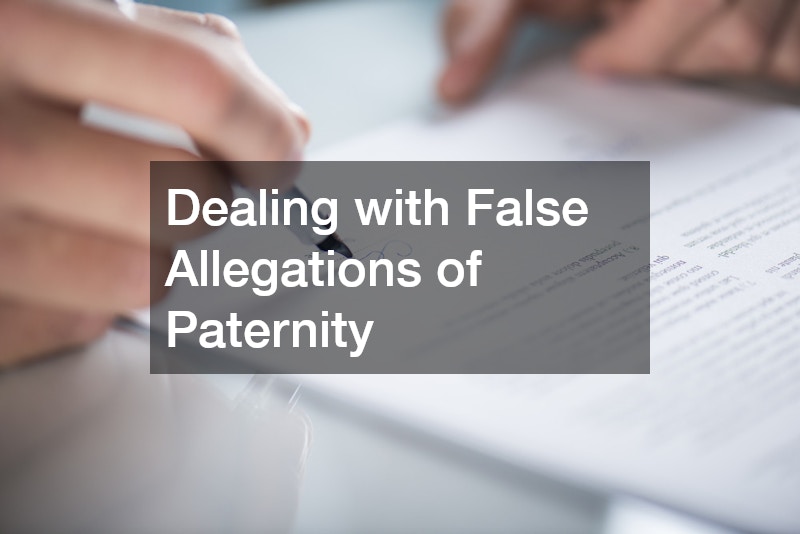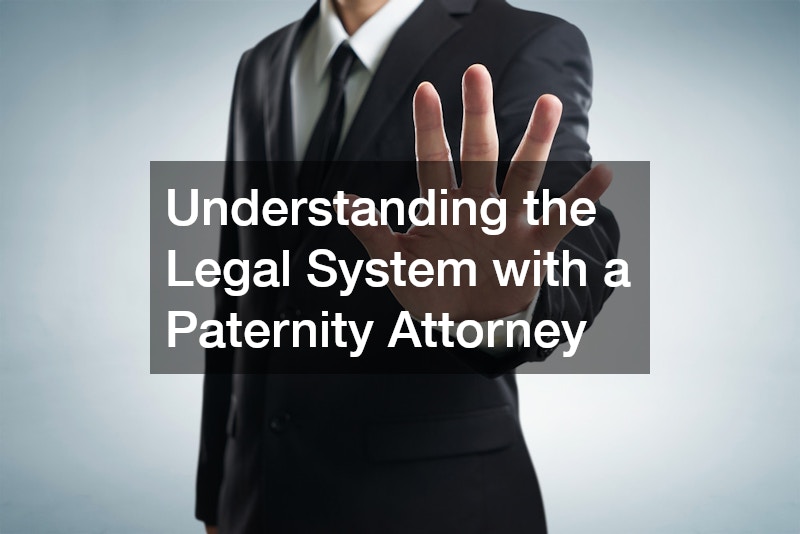
Navigating paternity rights can be emotionally overwhelming and legally complex, making it essential to understand how a paternity attorney can help. Establishing paternity is more than determining biological relationships—it’s about defining legal obligations and securing parental rights that affect a child’s well-being. Whether you’re a father seeking custody, a mother needing financial support, or an individual contesting a false claim, a qualified family law attorney who specialises in paternity cases can offer vital assistance. These attorneys are experienced in criminal law procedures and can guide you through the technicalities of DNA testing, custody arrangements, and support orders.
In today’s legal environment, where paternity issues intertwine with other legal areas such as record expungement, chapter 7 bankruptcy, or even premise liability, it’s critical to have a specialist who understands the broader legal landscape. From appeals lawyer expertise in contesting rulings to traffic violation lawyers aiding in related legal hurdles, understanding your rights requires a multidisciplinary approach. This article offers a comprehensive guide on how paternity attorneys provide support in various legal situations, ensuring that clients are not only protected but also informed throughout the entire process.

What is a Paternity Attorney?
A paternity attorney is a type of family law attorney who focuses on legal issues related to establishing and contesting paternity. While all paternity attorneys are family law attorneys, not all family law attorneys specialise in paternity cases. These legal professionals possess qualifications and licensure that allow them to practice in family courts, where they represent clients in matters concerning the legal recognition of a child’s biological father. Their scope of practice includes initiating paternity actions, defending against unfounded claims, and ensuring that child custody and support orders reflect the child’s best interests.
Unlike general criminial attorneys or those focusing on chapter 7 bankruptcy, paternity attorneys bring a unique blend of legal expertise and emotional sensitivity to their practice. Their responsibilities often extend to helping clients complete necessary legal documentation, representing them in court, and negotiating settlements or parenting agreements. Many also have experience in related areas, such as appeals or record expungement, enabling them to offer comprehensive legal support. Whether assisting in voluntary acknowledgments or handling complex DNA disputes, a paternity attorney ensures that clients’ rights are fully advocated throughout the legal process.
Why Establishing Paternity is Important
Establishing paternity is a foundational step in defining the legal and emotional ties between a father and child. From a legal standpoint, it opens the door for determining child support obligations and custody arrangements. It enables the child to receive benefits such as inheritance, social security, and health insurance. Additionally, once paternity is legally established, a father gains enforceable rights, including visitation and decision-making authority.
From the child’s perspective, knowing one’s paternal identity can contribute to a stable sense of identity and emotional well-being. It also allows for a complete medical history, which may be vital in future health decisions. Financially, paternity establishment ensures that the child receives necessary support from both parents. For mothers, it can mean access to financial contributions from the father, relieving the burden of sole responsibility.
Failing to establish paternity can complicate matters in cases involving drunk driving attorney incidents where the father’s legal responsibilities come into question or when addressing child support during a chapter 7 bankruptcy. It can also affect immigration matters or lead to more complex criminal law procedures when paternity disputes escalate. Ultimately, a family law attorney specialising in paternity is crucial to ensure that legal obligations and benefits are fairly and legally established.
How Can a Paternity Attorney Establish Paternity?
A paternity attorney uses several legal avenues to establish paternity, beginning with DNA testing, which is often considered the gold standard for determining biological relationships. Courts may order genetic testing in contested cases, and the attorney ensures all procedures are followed to uphold legal standards. In cases where parties agree on parentage, voluntary acknowledgment forms can be filed, simplifying the process.
However, not all paternity cases are straightforward. Contesting paternity may involve disproving presumptive fatherhood, often requiring substantial evidence and court intervention. Attorneys are vital in these disputes, especially when protecting clients from paternity fraud. They help navigate legal protections and ensure that rights are not unlawfully assigned or denied. In certain circumstances, individuals may also relinquish paternity rights, and a qualified paternity attorney ensures this process adheres to legal protocols.
These legal intricacies often intersect with broader issues. For instance, clients dealing with personal injury or premise liability cases may need to clarify familial responsibilities. Criminal law procedures might also come into play if fraud or coercion is involved. With the backing of a skilled family law attorney, clients can establish or dispute paternity through legitimate, legally recognised means.

What Rights Does a Father Have Once Paternity is Established?
Once paternity is legally established, a father gains a range of rights that extend beyond financial obligations. He may seek custody or visitation, participate in major decisions affecting the child’s education, health, and welfare, and gain access to school and medical records. This legal recognition enables the father to play an active role in the child’s upbringing.
These rights are protected by the same legal standards that apply in broader family law contexts. Fathers may contest adoption proceedings or assert rights in immigration cases. In instances where criminal law procedures intersect, such as with a prior record expungement or DUI issues involving a drunk driving attorney, having paternity established can strengthen or complicate legal positions.
Moreover, having a paternity attorney ensures that these rights are asserted appropriately and respected by the court and other involved parties. Whether filing motions, attending hearings, or negotiating parenting plans, your attorney ensures your voice is heard. Fathers with previous interactions involving appeals lawyer services or traffic violation lawyers may also benefit from a more integrated legal strategy when paternity rights are involved.
Navigating Child Support Issues with a Paternity Attorney
Child support is one of the most critical legal matters once paternity is established, and a paternity attorney plays a central role in determining and enforcing it. The attorney assists in calculating support amounts based on income, custody arrangements, and other financial factors. They also help in modifying existing orders when financial situations change significantly.
Enforcement is another area where paternity attorneys provide crucial support. If a parent fails to pay, legal action may be required to collect back payments. Attorneys may pursue wage garnishment, tax refund interceptions, or other enforcement actions. Non-payment can lead to further legal consequences, potentially affecting visitation rights and resulting in criminal law procedures.
In some cases, challenges arise, such as disputes over income or attempts to avoid payment through Chapter 7 bankruptcy. Here, the paternity attorney ensures that child support remains a priority, as it is rarely dischargeable in bankruptcy. Their understanding of overlapping legal disciplines, from criminal defence to personal injury claims, allows them to safeguard the child’s financial well-being while upholding the parent’s rights.
Can a Paternity Attorney Assist in Custody Disputes?
Yes, a paternity attorney is instrumental in custody disputes. Once paternity is established, they help fathers assert their right to custody and visitation. This includes filing motions to determine or modify custody arrangements and representing clients during mediation or in court. Attorneys ensure that all proceedings follow the best interest of the child standard, a key consideration in family law.
Custody can be physical (where the child lives) or legal (who makes decisions), and disputes can arise during divorce, separation, or independent of marital status. A paternity attorney is especially valuable in navigating collaborative law processes and ensuring that agreements reflect the father’s legal standing.
Moreover, custody issues often intersect with other legal challenges. If there are existing criminal charges or traffic violations, having support from a team including traffic violation lawyers or criminial attorneys can be crucial. In high-conflict cases, a paternity attorney ensures that false claims or past legal issues do not unfairly influence custody outcomes. Their ability to coordinate with other legal professionals, including those specialising in premise liability or appeals, strengthens the client’s position in court.

Dealing with False Allegations of Paternity
False paternity claims can have serious legal and emotional consequences. A paternity attorney helps defend against such claims by initiating DNA tests and filing necessary legal motions to refute paternity. In cases of fraud, they guide clients through civil litigation or criminal law procedures to hold fraudulent parties accountable.
Paternity fraud occurs when someone knowingly misidentifies a child’s father. Legal recourse includes requesting repayment of wrongly paid child support or seeking record expungement to clear court records. Attorneys also assist with protective orders when needed and can file appeals if a previous ruling was based on inaccurate information.
False allegations may also stem from complicated relationships or attempts to manipulate custody and support rulings. Having a qualified attorney ensures that every step of the defence is legally sound. Their experience in related fields, including chapter 7 bankruptcy, personal injury, and even appeals law, enables a well-rounded strategy that protects the client’s financial and parental interests.
What Happens in Cases of Paternity Denial?
Denying paternity involves a formal legal process, often initiated by DNA testing. A paternity attorney helps clients navigate this process by collecting evidence and filing necessary court documents. Denial impacts child support obligations and may influence custody or visitation arrangements. However, legal systems often operate on rebuttable presumptions—meaning a man married to the mother at the time of birth is presumed to be the father unless proven otherwise.
If paternity is denied successfully, the father may be released from financial and legal obligations. However, if the denial is contested, it could escalate into complex litigation requiring appeals lawyer services. Attorneys also help challenge paternity rulings through legal channels, ensuring that due process is followed.
In more complicated scenarios involving criminal law procedures or concurrent legal issues, such as premise liability or record expungement cases, having a multidisciplinary legal team ensures comprehensive representation. A paternity attorney’s guidance is invaluable in maintaining compliance with family court procedures while addressing broader legal implications.
How to Find and Choose a Qualified Paternity Attorney
Finding a qualified paternity attorney begins with thorough research. Look for attorneys who specialise in family law and have demonstrated success in paternity cases. Evaluate their experience, client testimonials, and case outcomes. It’s essential to confirm their licensure and verify whether they’ve handled cases involving criminal law procedures or record expungement, which may intersect with your situation.
During the initial consultation, assess the attorney’s communication style and strategic approach. Discuss fee structures and ensure that you understand what services are included. A well-qualified attorney should be transparent about costs, timelines, and legal expectations.
References and credentials can also indicate a strong reputation. If your case involves overlapping legal concerns—like chapter 7 bankruptcy, premise liability, or appeals—ensure your attorney has access to or works with relevant specialists, such as traffic violation lawyers or drunk driving attorneys. Choosing the right legal professional ensures effective representation and peace of mind.

Understanding the Legal System with a Paternity Attorney
The legal system can be daunting, but a paternity attorney guides clients through every step, from filing initial documents to attending court hearings. Family court procedures involve strict timelines and documentation standards. Attorneys help compile necessary paperwork, submit filings accurately, and communicate with opposing counsel or legal entities.
Negotiations are another critical component. Whether through mediation, arbitration, or courtroom litigation, a skilled attorney protects your interests. They help interpret complex legal jargon, negotiate settlements, and ensure compliance with judicial orders.
In cases involving appeals, criminal law procedures, or even personal injury matters, a paternity attorney coordinates with other specialists to build a strong case. This integrated approach ensures that clients receive thorough legal protection and effective advocacy.
Securing Your Parental Rights with the Help of a Skilled Paternity Attorney
Navigating the legal complexities of paternity requires not only emotional resilience but also professional legal support. A paternity attorney serves as a vital advocate, guiding clients through every stage of the process—from establishing or contesting paternity to negotiating custody and support arrangements. These legal professionals combine knowledge of family law with experience in areas like criminal law procedures, record expungement, and chapter 7 bankruptcy, providing a holistic approach to parental rights.
Whether you’re facing false allegations, struggling with child support enforcement, or simply seeking to assert your rights as a parent, a family law attorney with paternity expertise can offer clear, effective guidance. In today’s multifaceted legal environment, issues such as personal injury claims, premise liability, and even traffic violations can have an impact on family matters. That’s why choosing a paternity attorney who collaborates with specialists, including appeals lawyers and drunk driving attorneys, ensures you receive the comprehensive support you need.
Understanding your rights and responsibilities is the first step toward achieving a just and favourable outcome. With a skilled paternity attorney by your side, you can move forward confidently, knowing your legal interests—and those of your child—are in capable hands.



